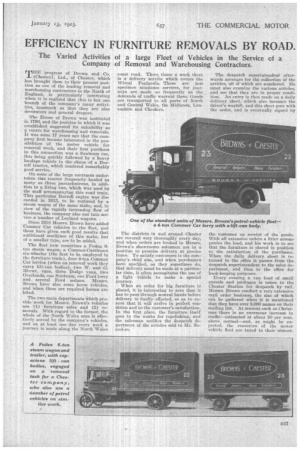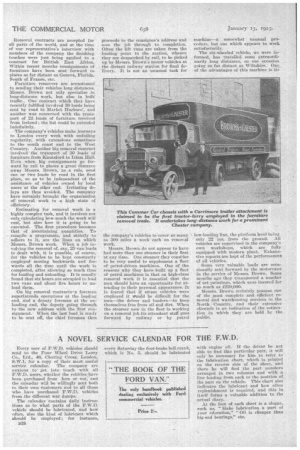EFFICIENCY IN FURNITURE REMOVALS BY ROAD.
Page 11

Page 12

If you've noticed an error in this article please click here to report it so we can fix it.
The Varied Activities of a large Fleet of Vehicles in the Service of a Company of Removal and Warehousing Contractors.
T"progress of Brown and Co. (Chester)-; Ltd., of Chester; which has brought them to their present position as one of the leading removal and warehousing contractors in the North of England, is particularly interesting when it is realized that this is but one. branch of the company's many activities, inasmuch as that they are also decorators and general drapers.
The House of Brown was instituted in 1796, and the Position in which it was established. suggested its suitability as a centre for warehousing and removals. It was some 17 years ago that the company first became interested in the possibilities of the motor vehicle for removal work, and their first purchase in this connection was a Sunbeam car, this being quickly followed by a heavy haulage vehicle in the shape of a Burrell tractor, which rendered remarkably good service.
On some of the large contracts undertaken this tractor frequently hauled as many as three pantechnicons, in addition to a living van, which was used by the staff accompanying this road train. This particular Burrell engine was discarded in 1913, to be replaced by a steam wagon of the same make, and, in view of the rapidly increasing flow of business, the company also put into service a number of Leyland wagons.
Since 1918 Messrs. Brown have added Commer Car vehicles to the fleet, and these have given such good results that additional machines of this make, but of a smaller type, are to be added.
The fleet now comprises a Foden 6ton steam wagon, a Commer-Carrimore six-wheeler (the first to be employed in the furniture trade), four 4ston °Grinner Car lorries (when on removal work they carry lift-van bodies), two W. and .G. 80-cwt. vans, three Dodge vans, two Overlands, one. Sunbeam, one Ford lorry and several Ford sedans. Messrs. Brown have also some horse vehicles, and when these are required horses are The two main departments i'Vhich provide work for Messrs. Brown's vehicles are (1) furniture sales and (2) removals. With regard to the foriner, the whole of the North Wales area is effectively served by the company's vehicles, and on at least one day every week a journey is made along the North Wales coast road. Three, times a week there is a delivery serviee which covers the Wirral Peninsula. These are just specimen minimum services, for journeys are made as frequently as the _ demands of traffic warrant them. Goods are transported to all parts of North and Central Wales, the Midlands, Lancashire and Cheshire.
The districts in and around Chester are covered very thoroughly every day, and when orders are booked in Messrs. Brown's showrooms salesmenare in a position to promise delivery atprecise times. To satisfy customers is the company's chief aim, and when purchasers have specified, as they sometimes do, that delivery must be made at a particular time, it often necessitates the use of a light vehicle to make a special journey.
When an order for big furniture is placed, it is interesting to note that it has to pass through several hands before delivery is finally effected, so as to ensure that it will arrive in perfect condition and to the customer's satisfaction. In the first place, the furniture itself goes to the works for repolishing, and the salesman notifies the despatch department of the articles sold to Mr. Somid-so. The despatch superintendent afterwards arranges for the collection of the articles, all of which are numbered. He must also examine the various articles, and see that they are in proper condition. An entry is then made on a daily delivery sheet, which also becomes the driver's waybill, and this sheet goes with the order, and is eventually signed by the customer on receipt of the goods. With all extensive orders a fitter accompanies the load, and his work is to see that the furniture is placed in position to the satisfaction of the purchaser. When the daily delivery sheet is returned to the offide it passes from the despatch superintendent to the sales department, and then to the office for book-keeping purposes.
Every evening a van load of small parcels and packages is taken to the Chester Station for despatch by rail. Messrs. Brown conduct a very extensive mail order business, the size of which can be gathered when it is mentioned that they have over 8,000 names on their mailing list. At seasons such as Christmas there is an enormous increase in traffic—estimated at about 50 per cent. above normal—and, as might be ex peeted, the resources of the motor vehicle fleet are taxed to their utmost Removal. contracts are accepted for all parts of the world, and at the time of our representative's interview with members of the company the finishing touches were just being applied to a contract for British East • Africa. Within recent months consignments of furniture have been sent forward to places as far distant as Geneva, Florida, South of France, etc.
Furniture removers are accuetomed to sending their vehicles long distances. Messrs. Brown not only specialize in long-distance work, but also in bulk traffic., One contract which they have recently fulfilled involved 30 loads being sent by road to Market Harboro', and another was concerned with the transport of 22 loads of furniture received from Ireland ; the list could be extended indefinitely.
The company's vehicles make journeys to London every week with unfailing regularity, with extensions sometimes to the south coast and to the West Country. Another big removal contract involved the transport of 30 loads of furniture from Knutsford to Irlain Hall. Even when big consignments go forward by rail to places a great distance away Messrs. Brown, as a rule, send one or to loads by road in the first place, so as to be independent of the assistance of vehicles owned by local users at the other end. Irritating delays are thus avoided. The company have certainly brought the organization of removal work to a high state of efficiency.
Estimating for removal work is a highly complex task, and it involves not only calculating how much the work will cost, but also how it is going to be executed. The first procedure becomes that of ascertaining quantities. To compile a programme, and strictly to adhere to it, are the lines on which Messrs. Brown work. When a job involving the removal of, say, 25 van loads is dealt with, it is possible, of course, for the vehicles to be kept constantly employed moving backwards and forwards all the time until the work is completed, after allowing so much time for loading and unloading. It is usually found that six hours are occupied to load two vans and about five hours to unload them.
On big removal contracts, a foreman superintends operations at the loeding end, and a deputy foreman at the unloading end, the deputy going through to the new address with the first consignment. When the last load is ready to be sent off, the chief foreman then
proceeds to the consignee's address and sees the job through to completion. Often the lift vans are taken from the loading point to the station, whence they are despatched by rail, to be picked up by Messrs. Brown's motor vehicles at the distant railway station for final delivery. It is not an unusual task for the company's vehicles to cover as many as 500 miles a week each on removal work.
Messrs. Brown do not appear to have had more than one steamer in their fleet at any time. One steamer they consider to be very useful to supplement a fleet of petrol-driven machines. One of the reasons why they have built up a fleet of petrol machines is that on high-class removal work it is essential that the men should have an opportunity for attending to their personal appearance. It is feared that if stkam vehicles were employed it Would be difficult for the men—the driver and loaders—to keep themselves free from oil and dirt. When the steamer now in the fleet is working On a removal job its attendant staff goes forward by railway or by petrol machine—a somewhat unusual procedure, but one which appears to work satisfactorily.
The six-wheeled vehicle, we were informed, has travelled soma extraordinarily long distances, on one occasion going as far distant as Wiltshire. One of the advantages of this machine is its low-loading line, the platform level being only 22 ins, from the ground. All vehicles are supervised in the company's own workshops, which are fully equipped with modern plant. Exhaustive reports are kept of the performances of all vehicles.
Some Very valuable Toads are occasionally sent forward by the metorvans in the service of Messrs. Brown. Some months ago they transported a number of art paintings, which were insured for as much as £220,000.
Messrs. Brown certainly possess one of the most complete and efficient removal -and warehousing services in the North Country, and their extensive clientele is an indication of the estimation in Which they are held by the public.




























